Participators of Large-Scale Arctic Animals Study Expedition Tell About Work Results
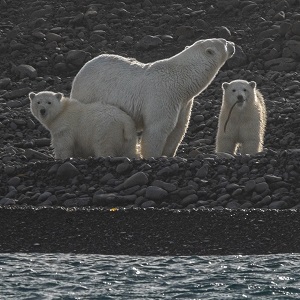
A press conference of the participators of the Arctic expedition organized by specialists of Rosneft Oil Company Arctic Research Centre LLC together with the A.N. Severtsov Institute of ecology and evolution of the Russian Academy of Sciences and the Center for Marine Research of Lomonosov Moscow State University. The scientists studied the Arctic animal species in the Kara and Barents seas waters and the Franz Josef Land archipelago.
Environmental protection is one of the key priorities for Rosneft Oil Company in its operations. For eight years the Company has been implementing the projects designed to preserve and restore natural resources, as well as to study animal species, which are the most important bioindicators of the state of the environment. The Company is implementing the project of biodiversity conservation which includes the monitoring and studying of the key animal species – polar bear, walrus, ivory gull, and wild reindeer.
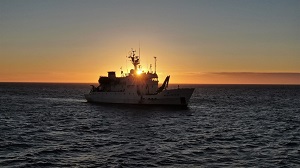 The expedition participants told the journalists about the aspects of work in the Far North and the results of their activities. For the first time, the complex studies of walruses and polar bears have been conducted almost at the same time in the isles of the Franz Josef Land archipelago. The collected information will help to correct the data about the state of populations of the animals from the Red Book in this region.
The expedition participants told the journalists about the aspects of work in the Far North and the results of their activities. For the first time, the complex studies of walruses and polar bears have been conducted almost at the same time in the isles of the Franz Josef Land archipelago. The collected information will help to correct the data about the state of populations of the animals from the Red Book in this region.
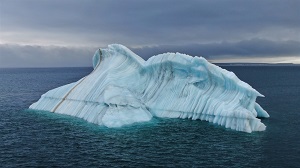 Within the framework of polar bear studies, the stationary observation of the animals on land and in water was made. The scientists managed to collect morphometric data of six bear individuals (three males and three females), to weigh them, to collect the samples of blood, fur, and biomaterials, to reveal the trends of animal spreading and behavior in ice-free season.
Within the framework of polar bear studies, the stationary observation of the animals on land and in water was made. The scientists managed to collect morphometric data of six bear individuals (three males and three females), to weigh them, to collect the samples of blood, fur, and biomaterials, to reveal the trends of animal spreading and behavior in ice-free season.
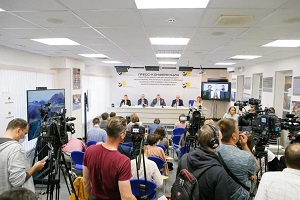 Within the framework of walrus studies, most of the known haul-outs were examined and a new one was discovered on the Jackson island. It was possible to collect the biopsy samples at all places of large animal packing that will allow conducting the large-scale molecular-genetic analysis of the Franz Josef Land archipelago Atlantic walrus group. The animals of different age-sex groups were equipped with satellite tags. In total, more than 3,300 walruses were counted. Earlier the group was thought not to outnumber 3,000 animals.
Within the framework of walrus studies, most of the known haul-outs were examined and a new one was discovered on the Jackson island. It was possible to collect the biopsy samples at all places of large animal packing that will allow conducting the large-scale molecular-genetic analysis of the Franz Josef Land archipelago Atlantic walrus group. The animals of different age-sex groups were equipped with satellite tags. In total, more than 3,300 walruses were counted. Earlier the group was thought not to outnumber 3,000 animals.
During the press conference, a unique atlas «Russian Arctic. Space. Time. Resource» was presented, issued by Rosneft Oil Company together with the Innopraktika non-governmental development institution. The atlas consists of 15 topical sections and is a collection of valuable scientific data on the physical geography, ecology, research history, and economic potential of the Arctic zone of the Russian Federation.
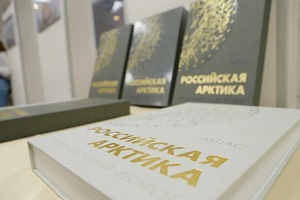 More than 140 authors – researchers, scientists, mapmakers, and illustrators – worked on this atlas for several years. Among them are many outstanding scientists such as corresponding members of the Russian Academy of Sciences Sergey Dobrolyubov and Valeriy Kryukov, professor of Lomonosov Moscow State University Vladimir Tikunov, and many more.
More than 140 authors – researchers, scientists, mapmakers, and illustrators – worked on this atlas for several years. Among them are many outstanding scientists such as corresponding members of the Russian Academy of Sciences Sergey Dobrolyubov and Valeriy Kryukov, professor of Lomonosov Moscow State University Vladimir Tikunov, and many more.
The main purpose of the atlas is to give insight into the Arctic and its significance for the internal economic development and the global ecosystem balance preservation to a wide range of readers. The atlas will be useful for specialists in many areas, scientists, economists, and enthusiasts interested in the North.
Note for Editors:
Since 2012, the Company has been studying hydrometeorological, ice and geotechnical conditions in license areas of the Arctic shelf. For these years over 20 integrated research and development expeditions were performed in the Russian Arctic seas: the Barents, Kara, Laptev, East Siberian, and Chukchi. No company in the world has conducted so many researches in the polar region.
The leading Russian scientific and design companies participate in the expeditions, the marine vessels of different types including atomic icebreakers, scientific research and expedition vessels, helicopters, drones, autonomous measurement equipment, descent underwater modules, the data of the Earth remote sensing are involved.
Results of expeditions in 2012–2020 enlarge the view of environmental conditions in Russian Arctic seas. An important part of supporting the work security in the Arctic is the rebound of the monitoring network shrunk by the dozens since the times of the USSR. Rosneft is the single commercial company which restores this network. The autonomous weather observation system in the Kara sea was restored by the Company.
The Company pays particular attention to rare and protected species, including those listed in the Red Book of the Russian Federation, regional Red Books, and the Red List of the International Union for Conservation of Nature. Since 2014, the year-round system polar bear researches are included in the program of the complex Arctic expeditions organized on the commission of Rosneft Oil Company.
Rosneft
Information Division
September 24, 2020